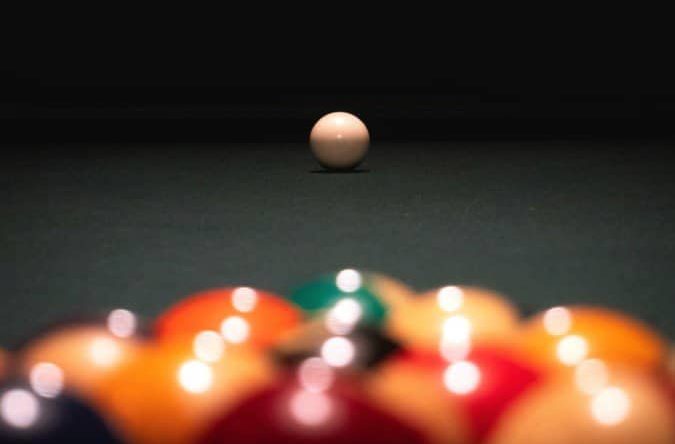Playing pool at the billiards can be very exciting or very relaxing. There are numerous game types too. This may lead you to wonder if you scratch on a break in pool, do you lose?
Typically, if you scratch on the break, you do not automatically lose the game, but you do lose your turn. This is the official WPA 8-ball pool rules.
Although this is considered the standard for 8-ball pool, different game variants have different rules when it comes to scratching on break. Keep reading to learn more.
Traditional 8-Ball Scratch-on-Break Rules
In a traditional game of 8-ball pool, many players use the WPA (World Pool Association) rules to play games. The WPA rules have clear consequences for players who scratch.
In 8-ball pool, players who scratch on break forfeit their turn. Whenever a ball makes it into a pocket, and a player scratches it, that player gets the opposite ball.
While these are the rules on break, other rules surround scratches when playing 8-ball pool. The rules depend on where you are playing and who you play with.
Below we have outlined some methods that break down the rules so you can dive deeply into all the different scenarios that will affect you if you scratch on break.
Want to know more tips on how to play pool? We’ve got you covered.
APA Scratch-On-Break Rules
Another set of pool rules is APA (American Pool Association) rules. These rules are a little more rigid than those of WPA, as they have more severe penalties for scratching.
It is a win if you pocket the 8 ball on the break unless you scratch or fly the cue ball off the table. If the latter occurs, it is considered an immediate loss.
This set of rules is more rigid than WPA rules and leaps and bounds more stringent than house rules. They are enjoyed by many in US pool halls.
Cutthroat Scratch-On-Break Rules
Cutthroat pool is a scenario where it is every man for himself. This is usually played in threes and involves 15 colored pool balls. Two different scratch scenarios can occur:
- If a player scratches and does not hit any other ball, their turn ends with no penalty.
- If a player scratches and hits a ball into a pocket, the player whose turn is next can take the ball out of the pocket and place it wherever they want on the table.
Scratching can turn a game around in its entirety. It can turn the tides so that the other players have a better advantage and get more balls sunk quicker.
House Rules: Scratch-On-Break
If you are not a professional pool player and just play at your friend’s house or your own home, then the official WPA rules may not be the instructions you follow.
Many people who play pool at home provide their guests with house rules. These house rules are different depending on whose house you play at.
Before starting a game of pool, ask your friends or family if they have any special house rules you should be aware of. If you want to make up your own rules, below are some ideas.
One-Pocket Pool
One-Pocket pool is a variation that requires two teams to go head to head. Players can only score points in two corner pockets of the pool table.
The first person to sink the 8 ball in their own pocket is the winner of the game. Neutral pockets do not work and have penalties if the 8 ball lands in one.
When it comes to scratching during one-pocket pool, the rules are as follows:
- A scratch ends the player’s/team’s turn
- A foul ends the player’s/team’s turn
- Balls that were pocketed on a scratch do not count, and a one-ball penalty will occur
When playing one-pocket pool, it is essential to avoid it as it can have detrimental results during the pool game.
Bumper Pool
Bumper pool is played on a smaller pool table than a standard 9-foot option. This means that there is a lot of knocking into each other’s balls, hence the name Bumper Pool.
This game considers scratches and “fouls,” and the penalty is different depending on the circumstance of the foul. The following are the fuels for fouls:
- Hitting your own ball off the pool table renders it placed in the middle
- Hitting your opponent’s ball off the table results in it being placed back in its spot, and one of your balls moves to the center of bumpers.
These rules are more lucrative when playing bumper pool and result in a better result for both parties most of the time.
Carrom
This type of pool plays off of chess. Each ball represents a piece, and each ball is a puck. Players take turns sinking their pucks until they sink the Queen.
When players scratch or have a foul in Carrom, they lose their turn. A penalty puck is placed on the table, and all pucks sunk that turn will come back into play on the table.
Your opponent’s pucks will be unaffected unless you pot their last puck. In this case, it will go back to the table for play.
We’ve got more detailed instructions on how to play Carrom.
This type of pool is not traditionally played with regular balls, but some players use regular pool balls when in a pinch, so it’s a great style to keep in mind.
Straight Pool
Straight pool is a type of pool that involves a point system for each player. Points are added or subtracted depending on the circumstances behind the shot.
Two points are deducted from their overall score when a player scratches on break during straight pool. The opponent can accept the ball as is or move it back to attempt a break shot.
This can turn the tables when it comes to this type of game. If players scratch on break, they give up the ability to pick if they want solid or stripes, which can affect them at the end.
Snooker
Snooker is a pool game played on a larger twelve-foot table. Each colored ball has a set of points associated with it. A sequence must be followed, starting with the red ball.
When a player scratches on break in Snooker, they lose their turn, and their opponent can attempt the break. This continues until a successful break occurs.
Players continue to play until all of the balls are sunk. They take their point total, and whoever has the most points at the end is considered the winner.
One Size Does Not Fit All
There is always a penalty in pool when you scratch on break. In most cases, a scratch on break will not result in the automatic loss of the game.
Next time you scratch on break, remember the rules of the type of game you play. Then take a deep breath, and carry on. Enjoy the game; we all scratch on break sometimes.

